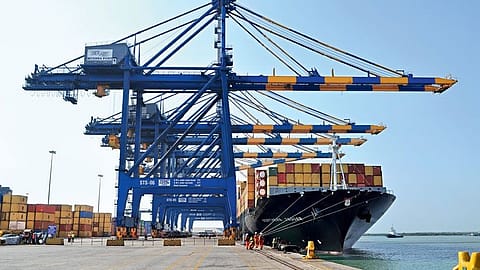Adani Ports posts record-breaking ₹11,061-crore profit in FY25, expands global port footprint
From Vizhinjam to Colombo, APSEZ anchors its global ambitions with strategic wins across ports, logistics, and marine operations.

Adani Ports and Special Economic Zone Limited (APSEZ), India’s largest private port operator, reported a record-breaking ₹11,061 crore net profit for FY25, marking a 37% year-on-year surge. The company attributed the growth to robust performance across ports, logistics, and marine services—key pillars of its ambition to evolve into the world’s largest ports and logistics platform.
Backed by a multi-year strategy to integrate ports with inland logistics and marine capabilities, APSEZ’s transformation continues at pace, with its full-year 2025 revenue touching ₹31,079 crore, up 16%, and EBITDA rising to ₹19,025 crore, up 20%.
“Our record-breaking performance in FY25—crossing ₹11,000 crore in PAT and handling 450 MMT cargo—is a testament to the power of integrated thinking and flawless execution,” said Ashwani Gupta, Whole-time Director & CEO of APSEZ. He added that the company’s momentum would only accelerate in full-year 2026.
APSEZ’s cargo volumes hit an all-time high of 450 million metric tonnes (MMT), a 7% increase over last year. Its flagship Mundra port became the first in India to handle over 200 MMT in a single year. Meanwhile, the newly commissioned Vizhinjam port—the country’s first deep-sea transhipment hub—crossed 100,000 TEUs in a single month just four months after commencing operations.
The company also began operations at the Colombo West International Terminal, marking a major expansion in South Asia. APSEZ’s global footprint further extended with its acquisition approval for North Queensland Export Terminal (NQXT) in Australia and a 30-year concession to manage a container terminal at Tanzania’s Dar es Salaam port.
The logistics vertical posted a 39% increase in revenue, driven by expanded trucking operations, integrated freight network services, and new offerings like a Trucking Management Solution (TMS) and international freight platform.
The marine services business also witnessed a strategic push, bolstered by the acquisition of Astro Offshore and a growing fleet of 115 vessels. APSEZ expects marine services revenue to triple within two years.
APSEZ maintained strong financial discipline, reducing its net debt-to-EBITDA ratio to 1.9x from 2.3x last year. The Board recommended a dividend of ₹7 per share, totalling an estimated payout of ₹1,500 crore.
On the sustainability front, APSEZ commissioned 225 MW of renewable energy capacity and was ranked in the top 10 globally for transportation infrastructure in the 2024 S&P Global Corporate Sustainability Assessment. It also received “A–” leadership band ratings from CDP in both climate and water categories.
The company reaffirmed its commitment to becoming net zero by 2040 and joined the World Economic Forum’s ‘Transitioning Industrial Clusters’ initiative through the Adani Mundra Cluster.
For FY26, APSEZ has issued guidance of ₹36,000–38,000 crore in revenue and ₹21,000–22,000 crore in EBITDA, with a projected capex of ₹11,000–12,000 crore. Cargo volume is expected to rise to 505–515 MMT. APSEZ’s continued integration of port, logistics, and marine assets positions it advantageously amid shifting global supply chains.
(INR CR)
